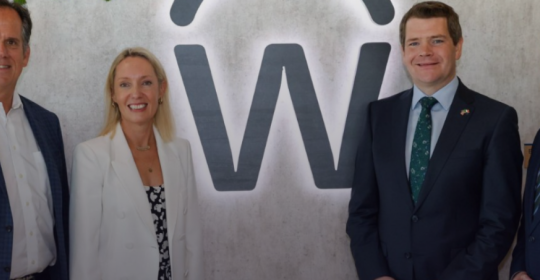Corporate UK is leading the way in training practices, according to a comprehensive pan-European survey published today by Europeís largest training provider Cegos Group.
The survey found that UK organisations are training more staff and have embraced innovative practices - including e-learning, blended learning and mobile learning - to a greater extent than their European counterparts. The move reflects the time and budget pressures of todayís workplace. The training function in the UK is also significantly more focused on measuring the effectiveness and return on investment (ROI) of training, the survey reveals.
The independent survey examined training practice trends during 2007, and was carried among training managers from 1,000 companies employing more than 500 staff, across the United Kingdom, France, Germany, Italy and Spain.
Key highlights include:
ï Corporate UK trains more people: UK companies are leading the way in providing training to the majority (61%) of their employees. In Italy, France and Germany, less than half of staff receive any form of training.
ï UK companies use more innovative training practices: More employees in the UK are benefiting from technology-driven training programmes than in any other European country. Corporate UK is the European leader in 100% e-learning and blended learning (mixing face-to-face learning with e-learning). More than half of all UK employees now take part in 100% e-learning based training (55%) and blended learning (51%) courses. Spain is just behind the UK in terms of e-learning and blended learning techniques with 51% of Spanish companies adopting e-leaning and blended learning. Mobile learning is also more popular in the UK with 17% of employees using this method.
ï Time and budget pressures increase demand for shorter, more cost-effective programmes: While the UK is training more people than any other country, it is running shorter programmes and spending less on professional development than its European counterparts. Tight funding and the need to fit training in around day-to-day work are driving a trend towards shorter, bite-sized training programmes with the rise in e-learning and blended learning playing a pivotal role in reducing costs, says Cegos. The survey found the average European corporate spends Euros 580,000 on professional development. France spends the most, around three times more than UK corporations. The UK and Spain both spend around 40% less than the average European budget, reflecting in part their greater use of blended learning and e-learning says Cegos.
ï Training is more accountable among UK plc: UK corporations are more focused on providing direct feedback to the balance sheet in the effectiveness of training than their European counterparts. Almost half (47%) of UK companies measure ROI and 65% have measures in place to assess the impact of training on their people. The UK is 20% better than any other surveyed country in measuring ROI with France second, where 26% of companies measure ROI.
(Please note full survey figures are included in the appendix.)
ìItís good to see so many UK training departments are leading the pack in accessibility, content delivery and accountability,î said Jeremy Blain, Joint Managing Director of Cegosí UK operations. ìTechnology is playing a crucial role in driving down the cost of training, speeding up learning and making training more accessible to a wider audience. This trend will continue to be driven by todayís time-pressured workplace and current economic conditions as companies strive to get more for less.î
Training Comes of Age
The survey shows that training is now a mature discipline across Europe with a dedicated person or department responsible for the function in nine out of 10 organisations. 96% of companies in Germany and 90% of companies in the UK and France had a person or department with training responsibilities, with Spain and Italy slightly behind at 84% and 79% respectively.
In addition, almost half of British, French and German corporations have a dedicated training centre or corporate university. Training centres were less popular in Italy and Spain, particularly Spain where only one in four companies have one. The average training centre has 17 instructors, the survey showed.
Training Source and Duration
The UK carries out more training in-house than any other country surveyed. Among UK organisations, more than half (55%) of training is carried out internally by the company itself; 24% is carried out in-house with support from a third-party supplier; and only about 20% is conducted off-site by external providers. France and Germany are the greatest users of external training courses run off-site ñ the use by both countries almost double that of the UK.
In terms of duration of training programmes, the survey revealed that UK companies prefer shorter training courses ñ 42% of sessions are one day long or less. As a mean figure, UK training courses are less than two days long compared to around three days in Germany and four days in Italy.
ìUK training departments are generally demanding activities condensed into bite-sized chunks, sometimes over longer learning periods. Long gone are days on end spent off-site on training courses. Many employees now have the necessary tools for interactive learning at their desk, with personalised content delivered on demand,î added Blain.
Training Methods
While companies still rely heavily on traditional methods to train their workforce, more and more are increasingly turning to the Internet as a delivery channel. Face-to-face learning is the number one method used by more than 90% of organisations across Europe. Coaching is particularly popular in the UK and Germany with 86% and 74% of companies respectively using the method compared to less than half of companies in France, Italy and Spain. The UK and Spain are the prime adopters of e-learning (55% of UK companies use e-learning and 51% of Spanish companies) and blended learning (51% of both UK and Spanish companies use blended learning). The UK also provides more on the job training and one-to-one training than any other country.
The figure below shows the percentage uptake of different training practices among employees:
Managing International Training Programmes
The survey identified a trend towards centralising the management of training in companies that operate across different countries. This was particularly apparent in UK and German multinationals. In 30% of UK multinationals, training is fully centralised and in a further 50%, training is part centralised and part controlled at country level. Across all countries, management training was the primary discipline of International training programmes.
ìMultinational companies are faced with the need to rapidly develop global training programmes that at the same time reflect the cultural nuances of individual countries. This has boosted demand for blended learning among suppliers who can offer European or global reach,î said Blain.
Training Content
All countries surveyed are focusing their training budgets on the same core areas. In order of investment, these are professional development, QSE (Quality, Safety and Environment), IT, and management, with 75% of organisations investing in these areas. The figures show the growing importance of CPD (Continuing Professional Development) and the impact that new legislation and IT systems are making on the training function (see Appendix for fuller breakdown of all areas of spend).
- ends -
Note to Editors
Research methodology
The survey was carried out by independent researcher CSA on behalf of Cegos.
In-depth telephone interviews were conducted with training managers from 1,000 companies employing more than 500 staff in the United Kingdom, France, Germany, Italy and Spain during 2007. 200 companies were randomly selected and interviewed for each country. The sizes of the companies were split as follows: 500 ñ 2,000 employees (37.5%); 2,000 ñ 10,000 employees (37.5%); multinationals employing > 10,000 staff (25%).
About Cegos
Cegos Group is Europeís largest training and learning and development company. It provides customised and ëoff-the-shelfí training solutions to some of the worldís leading blue-chip, public sector, and SME organisations.
Customers include American Express, CHEP, The British Library, The Met Office, Carestream Health, Coca Cola, Eastman Kodak Company, the European Commission, the European Space Agency, Henkel, Renault Nissan, the Royal Bank of Scotland, Schneider Electric (TAC), Warner Brothers, and a range of small and medium enterprises across the UK.
Founded in 1926, Cegos employs 1,400 staff worldwide and has an annual turnover of 153 million. In 2007, Cegos trained 190,000 professionals in fifty countries. Cegos is ISO 9001-2000 accredited.
Cegos UKís existence began in 1949 when the company was set up through an Act of Parliament as the sole consulting and training centre to the textile industry of Great Britain. Cegos UK is headquartered in Bracknell, Berkshire from where its learning and development programmes are delivered across the UK. For further information, please visit
Pan-European Training Survey Shows UK PLC Leading The Way

Blended Leaning and E-Learning continue to gain popularity across Europe with UK and Spain taking the lead. Survey also finds a move





